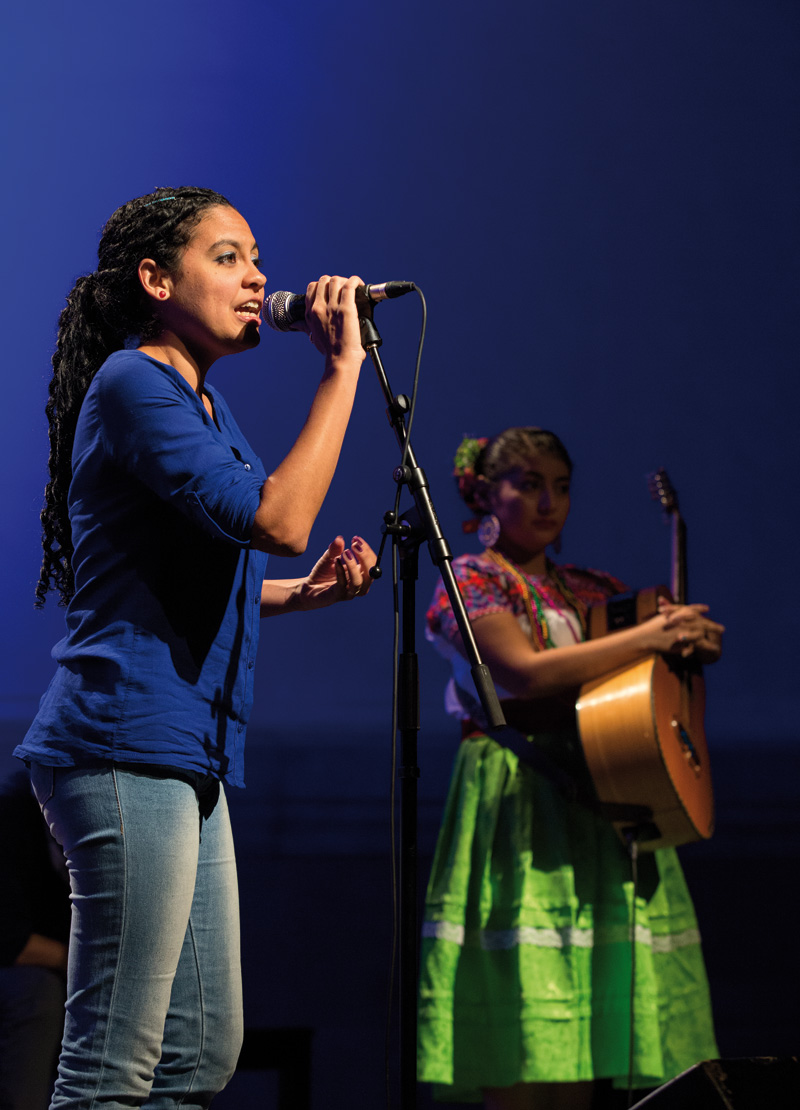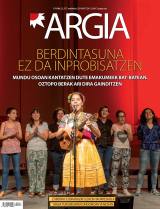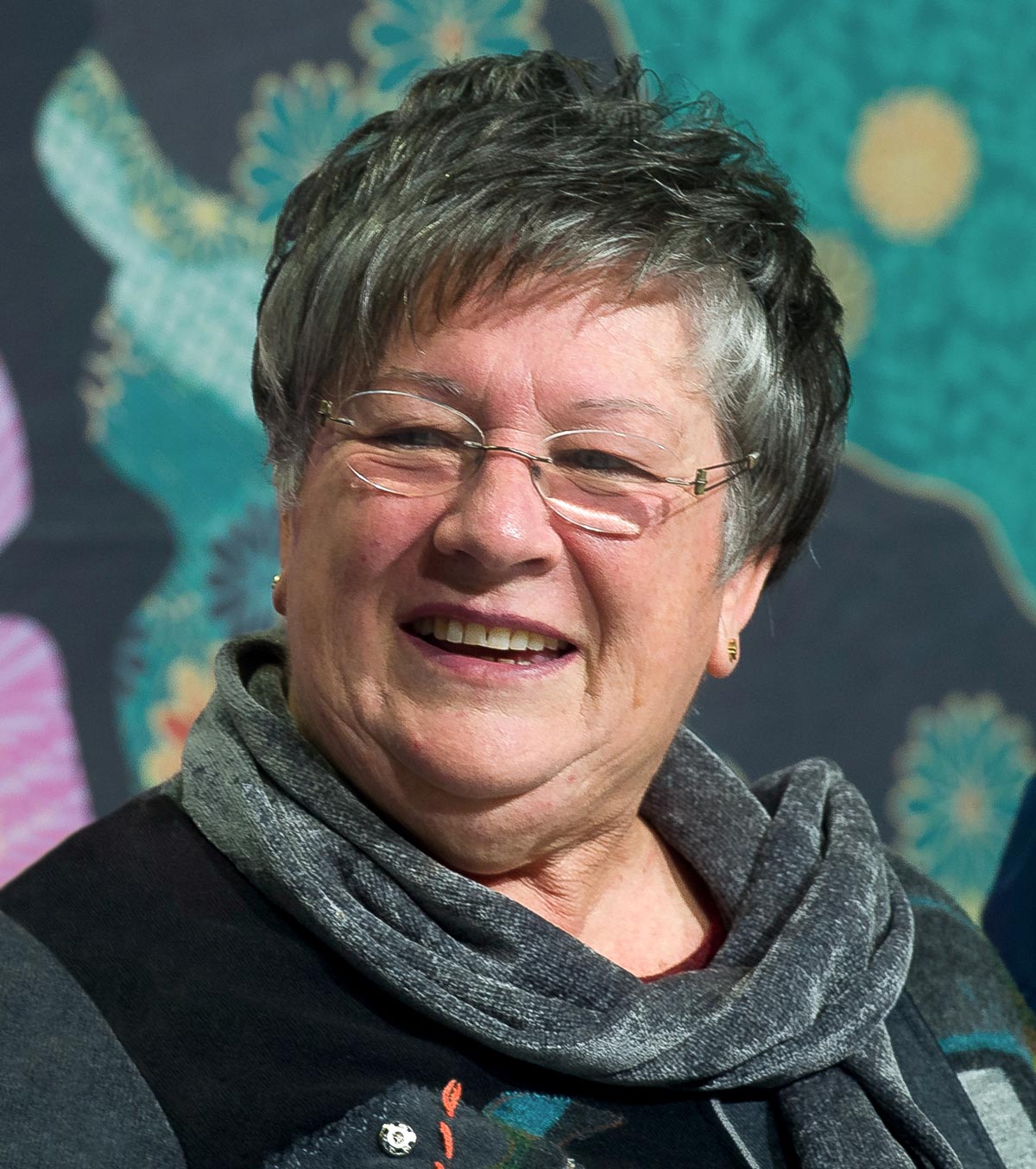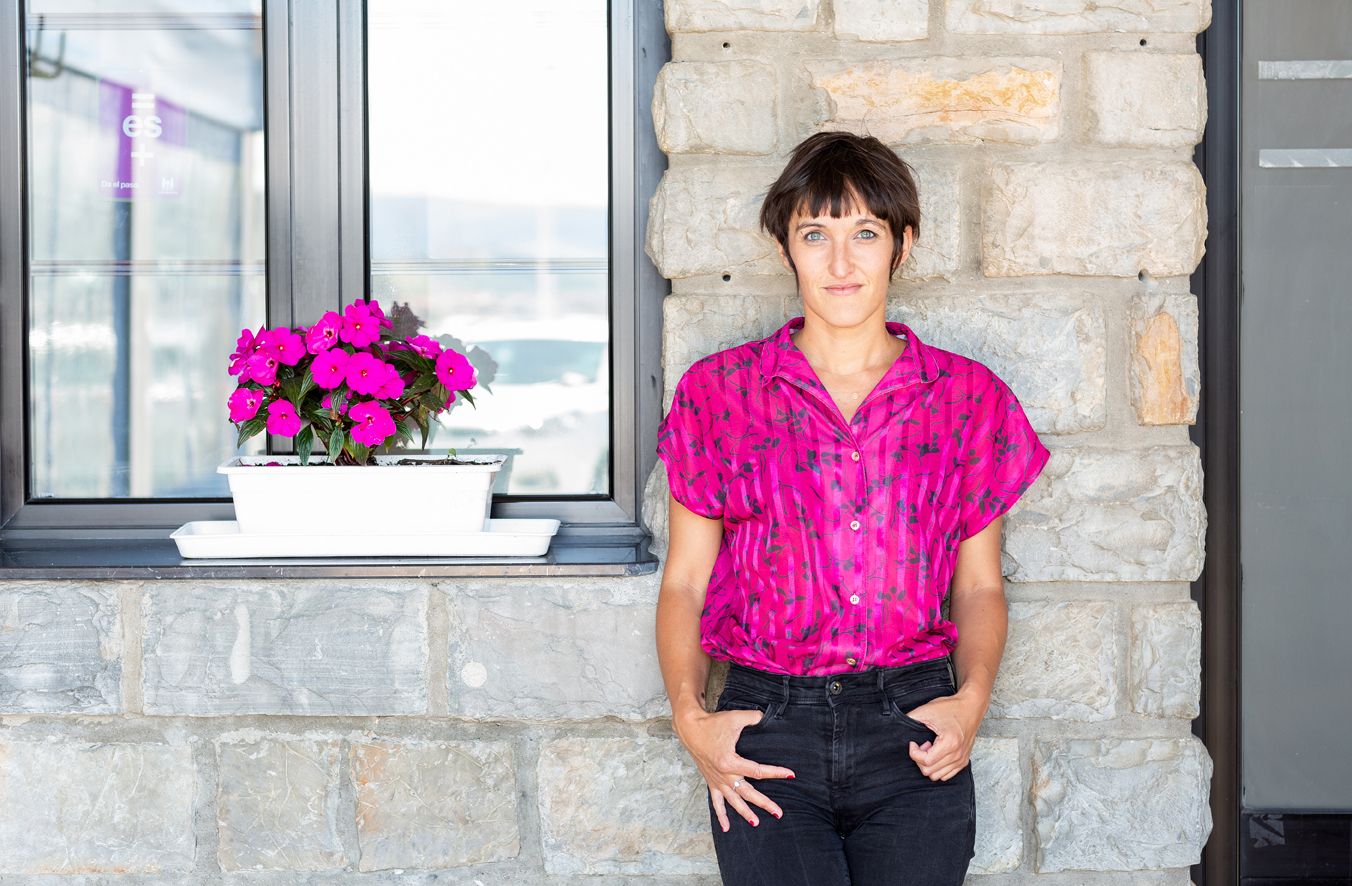Schools give women back the voice silenced by tradition
- From July 11 to 16, the Intercultural Meetings of Improvisers have been held for the second time in Euskal Herria, 13 years after that first edition. Organizes Mintzola, under the Cultural Capitality Donostia2016. Based on transmission, minority languages and gender perspectives, academic days have been held in the morning and the evening, even though each people is a world, we can conclude that it is the same path that women are going through through the experiences of Cuba, Huasteca, Wales, Mallorca and their improvisers.

Yunet López collected the laúd and the tenth instrument from his cradle. His cradle played in a very special house in Cuba: his great-grandfather, the great repentist Rigoberto Rizo Maldonado. In the 1940s he met at home the dominant improvisers in the “golden age of repentism”. López, in his speech on July 12, had a great deal of humor in how the family had discovered his gift: “No one knew I could improvise, and they knew it too late. Why? Because I was a little girl. All the attention of our house was put on my cousin: by the time the child turned 10, they made him his tenth, so that he could learn…”. In his school they held a first session to entice the students to the repentism workshop, but he decided not to go, “I prefer to see a film”. But when he returned to his room, he easily gave him a tenth. “No one had to teach me measurements, nor what I had to laugh at. From home, listening to what I heard, I had it internalized.”
In the repentism workshop he teaches Alexis Díaz Pepper, a great creator and repentist of the learning method of Cuban improvisation. Afterwards, classes of repentist were taught: “As he grew up, that cousin has become a musician and I have become an improviser. I only sang once with my great-grandfather: my end-of-course gift in the repensioning workshop was to sing a tenth in our house with each student, and in the end my great-grandfather said that he would also sing. He made me the greatest gift.”
Old tradition workshop
López's experience may reflect the path that women in every corner of the world are making in public improvisation: opening a gap in the male tradition transmitted at home from generation to generation, taking advantage of more egalitarian contexts such as workshops or school. This is what Arantzazu Loidi would say in his speech on 12 July, on the Bertsos school in Almen, that is, on the experience of the first bertsolaris schools: “Our teachers took care that I was one more. The support of the group was also very important to me, as my friends of the song were my close friends. When we started going to the championship, they did take care of reminding me that I was a child.” Loidi and Jon Sarasua stressed the teachers’ passion for the bertso eskolas, “they wanted to teach us what they liked so much. Without a great knowledge of the technique”.
The learning process of Rebeca Limón, Dana Sofua Limón and Diana Llana seems to us to be similar: Being from Mexico City, one day they took the steps for the huapango workshop. “The Huapango is a mixture of indigenous and flamenco music,” they also explained on July 12. It has fixed words and music, but sometimes they sing improvised stanzas that are called huasteco. “Huapango is transmitted from generation to generation, but we are from city to city and our parents did not know this music. We happen to meet our professor. He has no instruction, but he is very wise, because he knows a lot about life. And it's conveyed to us love for our culture. In each essay he told us about some of his experiences, for example, that in his time he had to walk a long way to go to the performances and therefore tried to learn as much as possible in the place of departure. He hasn’t taught us technique, he just told us ‘put your finger here, put your finger there’, and we played until it sounded good.”
It is clear that workshops are key to the survival of improvisation: “Many young people touch the huapango, but it’s very rare to see trovar, improvise. Improvisers are old and they're dying. Aware of this, they have opened the workshops, and we have also learned there. But many improvisers prefer not to teach others, “if it’s taken me so hard to learn it will cost you!” they think. They said that the workshops have opened the door to the women on stage: “Before it was the huapango of men, women danced under the stage. The workshops have changed that, now the voice of women is also heard, and today there are more women than men in the workshops.”
In the workshops fourteen, four and four
María Isabel Servera had a great deal of humor at the round table on July 13 that the women Majorca gloators have not yet developed collective consciousness, “because we are two alone”. But in the future it has hopes: “Participation in workshops is more balanced, we’re going to be half.” Why are they only two? The explanation shall be made public to the reader: “The context of the gloss was very masculine, it was sung at night and in the bars, and the women did not have access. Traditions give us good and bad things, and this is one of them. In Catalonia the situation is different: natural transmission has been interrupted, and although the old singer has referred to it, it has been reinvented. The result is the participation in the event held this year: 5 out of 8 have been women.”
At the same round table, López also said that in Cuba most of them are girls, “but by taking the stage, the numbers turn.” Look at Amuriza explained yesterday's: “There comes an age that becomes more serious than a game of bertsolarism and crosses with adolescence. The stage is critical and many girls retire. What happens then? That we each have their fears and their limitations. Those of us who have overcome that barrier, when we talk to other makeshift women over the years, we are aware that personal fears were not those of oneself, that we have all lived through. So it's important that women improvisers come together and talk about these things. In this way, we can also make it easier for those who come behind. You have to do the two paths, the collective and yours.”
“At an interesting time”
They talked about the consequences of being the only woman in an improvisation show. The main one is that this improviser becomes a female speaker, representing the archetypal woman, “the woman” (as if it were one and one). And that leaves a very narrow path for the development of one's own voice. Maialen Lujanbio was pleased to see how the landscape changes in the Basque Country: “The number of Bertsolaris women is increasing and we have very different women in the plaza: in addition to the profiles that would not be admissible 40 years ago. The fact that they are different women implies the appearance of different speeches, opinions, songs. That is why this Bertsolari woman who has been an archetype of women can relax, because that message will be given by more women, and we can start to work the nuances of women, not always appearing currents, representing the ugest differences… As a creator it gives a lot of tranquility and opening a creative spectrum for creativity”.
Poetry has no gender, but...
Karen Owen is one of the few women who decries improvised poetry in public in Wales. He advocated the overcoming of gender: “When I read the poem, I never ask if it is the work of a man or a woman. Sometimes, within the male tradition, amidst the machismo and testosterone that poems give, I ask, where has sensibility remained? It has nothing to do with gender, it has to do with the poet. What I look at is what feelings poetry makes me. Because in addition to the metric and rhyme, we must not forget the heart, the heart makes us reach the public. But the poem has no gender.” This last sentence was shared by improvisers from other parts of the world, but Lujanbio said the issue is more complex: “Okay, the bertso has no gender, what matters is a good bertso. But that phrase lacks the context. If it's a good verse that matters, the key is what a good verse is, and then we'd start to collide with the context and create questions. All the voices that are heard the same, all those that have the same confidence and belief in improvisation, if not, where that education comes from… Improvisation cannot be analyzed out of context. The difficulties of women as women are linked to the context. The work is what matters, but it is created by someone, and that is why it is collected or heard simultaneously”.
At the round table on July 13, after the world's improvising women shared their experiences, in the afternoon, they shared the stage. Even that attempt by Tabakalera could be interpreted better from experiences than from words.
.jpg)
.jpg)
.jpg)
Pictures of the session held in Tabakalera in the photos above and a half. In the photo below, July 13 round table: Ainhoa Agirreazaldegi, Karen Owen, Maria Isabel Servera, Rebeca Limón, Yunet López, Maialen Lujanbio and Miren Amuriza.
Jone Miren Hernandezek uztailaren 13an eman zuen hitzaldia. 2008tik ari da bertsolaritza genero ikuspegitik aztertzen, eta argitaratzear du bere ikerlana. 1990eko hamarkadan hasi ziren bertsolaritza ikuspuntu horretatik aztertzen duten ikerketak agertzen, eta Hernandezek azaldu zuen denetan badela elementu komun bat: “Translazio bat egiten dutela, gizarteko genero sistemak bertsolaritzan nola islatu diren aztertzen dute”. Berak, berriz, Carmen Larrañagak 1994an egin zuen bezala, bertsolaritzaren barruko ikuspegitik aztertu ditu genero elementuak. Bertsoa abiapuntu hartuta, hiru eremu hauek seinalatu zituen:
Bertsoa marko komunikatibo gisa.
Joseba Zulaikaren kontzeptua hartu du Hernandezek oinarri: “Zulaikak aipatzen du bertsoak eremu berezi bat sortzen duela, beste marko komunikatibo bat, eta marko horretan, normalean esaten ez direnak esaten direla. Batzuetan oso jakintzat ditugun gauzak ez ditugu egunerokoan esaten, euskaldunak garela eta abar. Bertsotan bai. Gainera, bertsolariak aukera du komunitateari hitz egiteko eta komunitatearen izenean hitz egiteko (‘herriaren ahotsa’ izateko). Bertsolaria hitzaren, boterearen, kudeatzaile da marko honetan”. Jarraian, generoari lotutako galderak pausatu zituen: “Emakumeak begiratuak izateko eta begira egoteko dira sozializatuak, eta ez euren begiradaren jabe izateko. Hori arazo da kudeatzaile izateko. Bestalde, zergatik ezin du eremu komunikatibo ezohiko horrek emakume/gizon dikotomia ezabatu? Posible da bertsotan bizikleta eta behi izatea, baina generoari buruzko gauza batzuk gainditzea ez. Zergatik?”.
Bertsoa eta talde identitatea.
Marko komunikatibo berezi horretan, bertsolariak elipsiak kudeatzen dituela azaldu zuen (jakinak diren kontu horiek aipatu gabe utziz). Publikoak paper aktiboa duela gogorarazi zuen, hari dagokiola bertsolariak elipsian utzitakoa betetzea. Baina, “publikoak zer du hutsune horiek betetzeko? Tradizioa. Eta gure tradizioan emakumeak ez du hitzik izan”.
Bertsoa ikur moduan, gizarte lotura moduan.
“Bertsoa hitzen trukea da. Hitzak boterea irabazi dezan, publikoaren kontsentsua edo adostasuna lortu behar du. Zer gertatzen da bertsotan genero ikuspegia azaleratzen denean? Zer gertatzen da partekatuak ez diren emozio edo nahiak mahai-gainean jartzen direnean? Halakoetan, emakume bertsolaria sortzen diren deserosotasunen kudeatzaile da”.
Kristina Mardaras, beste gauza askoren artean, bertsolaria da. Euskal Herriko Bertsolari Txapelketa Nagusian parte hartu zuen lehen emakumea izan zelako da ezagun, bertso munduan. Baina, baita hamaika bertso-saiotako antolatzaile eta entzule gisa ere. Izan ere, plaza utzi zuen,... [+]

























